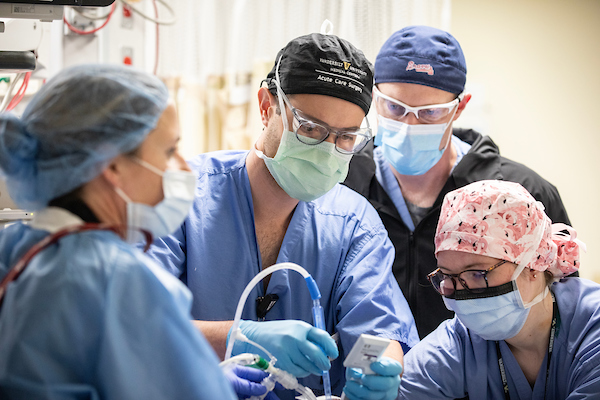As spring arrives and outdoor recreational activities increase, trauma surgeons at Vanderbilt University Medical Center are already seeing an increase in serious motorcycle accidents.
Last Sunday as temperatures rose across Middle Tennessee, VUMC treated five motorcycle accident victims. Unfortunately, one of these victims sustained injuries that were not survivable.
Spring brings the arrival of “trauma season,” which in the Southeast runs from April through September. During this period, physicians with VUMC’s Level 1 Trauma Center typically see a 50 percent increase in patients injured by major trauma, including motorcycle accidents.
With the unseasonably warm temperatures last weekend, the increase in traumatic motorcycle injuries began early this year.
“The advent of warm weather rolls out many activities such as motorcycle and ATV riding and cycling that require attention to detail and essential safety gear,” said Oscar Guillamondegui, M.D., associate professor of Surgery, medical director of the Trauma Intensive Care Unit and director of the Vanderbilt Multidisciplinary Traumatic Brain Injury Clinic. “Do not forget to be attentive, and always wear helmets when riding.”
Despite more than 40 years of definitive data that confirms increased deaths and medical costs in states that do not support universal motorcycle helmet laws, again this year members of Tennessee’s legislature have filed legislation to amend the state’s law. The legislation would make wearing a motorcycle helmet optional for riders 21 and older unless they are enrolled in the state’s Medicaid program TennCare.
VUMC’s trauma surgeons express concern over the proposed changes to the state’s current universal helmet law, that if passed will result in increased fatalities and increased health care costs for all Tennesseans.
According to the National Highway Transportation and Safety Administration (NHTSA) in states without a universal helmet law, 65 percent of motorcyclists killed in 2011 were not wearing helmets. In states with a universal helmet law, 9 percent of motorcyclists killed were not wearing helmets.
“The ability of motorcycle helmets to save lives and health care dollars through reduced severity of injury is without question,” said Richard Miller, M.D., professor of Surgery and chief of Vanderbilt’s Division of Trauma and Surgical Critical Care. “Tennessee’s universal motorcycle helmet law, enacted in 1967, has saved tens of thousands of lives and hundreds of millions of dollars.”
The National Highway Traffic Safety Administration (NHTSA) reports that in 2010 alone Tennessee’s motorcycle helmet law saved 46 additional lives and $94 million in economic costs.
“At a time when our state and our nation are attempting to reduce health care costs, this legislation, if enacted, will result in increased deaths and substantial financial consequences not only for the accident victims but for all Tennessee taxpayers,” Miller said.
According to the NHTSA, on average, motorcycle helmets reduce the risk of death by 37 percent, reduce the risk of traumatic brain injury by 65 percent, and save the U.S. approximately $3 billion each year in health care and societal costs. In 2010, the U.S. could have saved an additional $1.4 billion if all motorcyclists had worn helmets.
“The data is so convincing that motorcycle helmets save lives, this issue should be put to rest once and for all,” Miller said.
Tennessee’s neighbor Kentucky amended its motorcycle helmet law in 1998 to make helmets optional for riders over age 21. Kentucky has since seen the number of motorcycle-related fatalities rise by more than 50 percent. In Kentucky during 2013 there were 1,253 motorcycle injuries and 79 fatalities. Of those injured, 651 were not wearing a helmet. Of those killed, 53 were not wearing a helmet.












